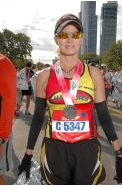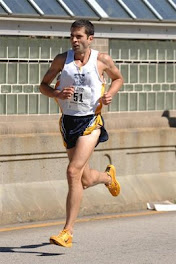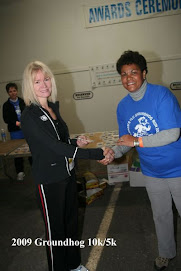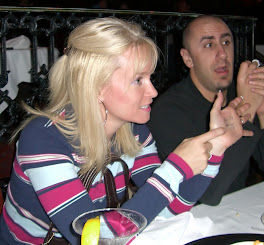skip to main |
skip to sidebar
I've noticed a phenomenon a few times recently after really great quality workouts / runs of late.
The hallmarks are: a hard, "quality" workout (e.g., long run with surges, several race pace or sub-race pace miles, lengthy tempo runs or speedwork like mile repeats) that requires a decent effort. This is never an "easy run" or "relaxed run" or "recovery run."
I'll get into a "cruise" mode where I am nailing every aspect of the run, feeling good, the effort is hard (but not maxed out). I'll always feel like I could keep going... almost indefinitely. I will have no real breaks in the run (no walk breaks anyway, there might be recovery jogs).
And then, the workout will be completed.
And then, I slow to a walk. And I suddenly went from a 3 on the tired / exhaustion scale (during the run) to about an 8 or a 9 the moment I stop. I'm just overwhelmed and think I couldn't run another step at that moment. Yet, seconds before.. I was cruising along just fine and could have kept going.
I also have the counter case. Fartlek runs with one minute surges are actually harder on me than longer surges. The one minute on, one minute off (say, 10 x 1 minute hard with one minute recovery) will fatigue me much more quickly during the run than just running, say, the same pace for 10 straight minutes. Or, at least I sense fatigue during the run much more quickly.
Feel free to write to me or comment on this issue if you've ever had it or can explain why it is happening. I assume it's a good thing, but I don't understand it.
I left my watch at home. We lined up dead last in the back. There were about 80 people or so, of various shapes and sizes. I was really hoping we didn't actually come in dead last, but I knew that was a distinct possibility. My only real goal today was to get my 6-year-old daughter across the finish line of the 1 mile fun walk / run. She'd gone that distance a few times, but it was never easy. And although she'd trained a little (for about a month), it was still a risk she might give up on me.
We started off at a nice slow jog (think 12+ minutes per mile). I was hoping we'd make it to the turn-around point before she'd beg for a walk break. But, since it was all uphill, no such luck. I did get her to walk / jog in repeated bursts all the way to the top. The rest was downhill.
Only one disappointment was that the course instructions included a small loop at the bottom of the hill before we turned into the parking lot. Intent on showing good manners and obeying the rules of the course, we took the loop while no one in front of us or behind us did. Even for a a fun run, if a race hands out places and assigns finishing times, the race director should have posted someone there to ensure all runners / walkers followed the rules.
The best part was crossing the finish line, holding her hand, and not dead last in fact; even with taking the loop. I think we were 44th. What a great feeling to share something so special with my child. I hope this is the beginning of many shared races! She says she wants to do a 5K now!
One thing is certain: everyone will recover from their workouts; no matter how hard or how tired they are after them. The key to sustaining intense training and being ready to train hard again quickly is in figuring out ways to more effectively recover. The faster you recover, the faster you can train harder again, and the more quickly your running will improve. For me right now, that's what it's all about. Recovery has become an art form to me.
I could write a full essay on each of these, but thought I'd quickly list out key elements of how I focus on my recovery, along with a few references here and there:
- Full Night's Sleep. Or, as is often in my case "eight hours of head down time." I actually had to promise to this before Vince would agree to give me more intense training as I prepare for Chicago. Although not always a great sleeper, I do commit to "head on pillow" time of at least eight hours per night, with few exceptions.
- Mind Body Connection. Admit it; you've found yourself in the middle of a crisis and you've gotten sick, a backache, a headache or some other manifestation of pain. When you are stressed or worried, your body releases stress hormones and kicks off a chain of reactions--chemical and otherwise--that lower the immune system and impede recovery. Your body will do what you tell it to do. Believe and visualize you are recovering and you can accelerate it. When you tell your body that you just "can't recover" or allow yourself to fret on end, your body will listen to you. Next time you have pain or exhaustion or stress, imagine your body healing and restoring itself. Visualize it several times per day.
- Calcium. This coming from someone who doesn't drink milk, eat yogurt and rarely eats any cheese. And, I hold nearly every risk factor for a stress fracture (but have never had one). Calcium can be a complicated equation. Calcium supplements alone are not enough--you must assure your body has everything it needs to absorb calcium in order build and maintain bone. You need vitamin D, K, magnesium. You need to watch the pH of your food so you don't contribute to the bone loss that already occurs every day. Don't forget--sunlight is great for vitamin D. There are some things that actually bind to calcium, therefore flushing it from the body. Do your research.
- Glutamine. Intense exercise drains your body of glutamine. Consider taking a glutamine supplement to boost your immune system and aid recovery during periods of intense exercise. I put a micronized powder version in a recovery drink daily.
- BCAAs. Branch chain amino acids supplementation before, during, or after exercise may have a strong effect on improving muscle protein balance. A powerful combination when you are also supplementing with Glutamine. Give it some time though. My weight initially increased the first couple of weeks (which made me stop in a panic the first time I tried), but then stabilized as my body fat dropped when I decided to be more patient.
- Omega 3s / Fish Oil. The Anti-inflammatory properties, mood balancing effects and cardio-vascular benefits well-proven, and are enough reason to take Omega 3s every day.
- Glycogen recovery. Glycogen is the runner's primary fuel. Immediately before, during and after a workout are the times for high-glycemic carbs. Your muscles are a sponge crying out to have their glycogen replenished. This is the one time you want your insulin to rise quickly and facilitate glycogen refill. Whether you do it quickly, so you aren't lagging and sluggish for days, or whether you do it slowly is largely controlled by you.
- Electrolytes. Potassium, magnesium, sodium play key roles in muscles contraction and relaxation, are required for proper nerve firing and brain function, and help wash away metabolic wastes that can contribute to sluggishness. They are also critical to the rehydration process. When your electrolytes drop, muscles cramp and fatigue can occur more quickly. Like the 30K mark for me on Ottawa (ouch!). I actually take potassium and magnesium supplements daily, as well as eat foods rich in them (like potatoes and bananas). If you experience arrhythmias and your doctor has cleared them as benign, try reaching for magnesium next time they flare up.
- Stretching. I recently read somewhere for about the third time in as many months that stretching can actually be detrimental if you are a runner. Note the emphasis on "before" running and "static stretching." When your muscles heal from their micro-tears, they form scar tissue. That tissue needs to be broken up through stretching (and massage if that's available to you). Proper stretching will also increase your mobility and flexibility. Check out "Active Isolated Stretching." The Wharton's (featured in Runner's World) have quite a program around this method, that I use nearly every day. Post-run, usually in the evening, and it also helps me relax and prepare for the 8 hours of rest that's coming my way.
- Chiropractic adjustments. With an extra cervical vertebrae, some lower-spine abnormalities as well as a slight leg length imbalance, this is part of my injury / pain prevention routine. If I'm not visiting Dr. Reed on a regular basis for a touch up adjustment, I will find myself in grinding pain somewhere unpleasant and need to get there in a hurry. I've found chiropractors vary widely in their abilities and knowledge. I've found one that treats runners and other competitive athletes. Every time I go, the first thing he does is measure my leg length to get a quick overview of my current status. And he's always right on. Lately, my leg length has been very even due to the routine care I receive--and I can really feel the difference.
- Treadmill runs. This one may have surprised you, but it's one of my best kept secrets. Running on a treadmill is easier on everything compared to outside. It's like running in a laboratory. No rocks, no road camber, no cracks, no hills, no pavement, no holes (oh, and bonus--NO DOGS!). The impact is minimal and there is little stress on your bones. While you should never do all of your runs on a treadmill (or you will be ill-prepared for running elsewhere, and sorely regret it--pun intended), a few of your weekly recovery miles--esp. if you are watching some nagging pain or have an injury--on a treadmill will help you keep your cardiovascular fitness up, while easing your body back into harder miles. Remember, you have to keep your incline at one percent to equal the speed of a flat surface on the road (due to no wind resistance and the belt moving).
- Ice. The panacea for just about every pain you've got, the more quickly the better. If you can point to a pain, ice it. It's that simple. Ice baths (for at least 15 minutes), ice soaks, ice packs, whatever works. And no you won't freeze your skin off. I can't believe how many well meaning people think you have to put a thick towel in between you and the ice bag. If it doesn't feel cold, you aren't icing it.
- Self Massage. I wish I could find the time to go to a masseuse weekly. I can't. But that doesn't stop me from using the stick (I use this one), a hand-held massager or just my good old right and left to smooth out my quads or calves if they are a little stiff.
Ok, I admit it. I blew it and did all of the wrong things with my diet on the 4th of July. And... I feel kinda bad about it. I ate crab (actually, I think it was "Krab") dip with cream cheese, lots of crackers, beer, some kind of yummy salad with dressing mixed in (a big no-no and I had two servings) and a chocolate chip bar. And other stuff I probably don't even remember. I munched myself deep into a calorie and fat glut. I'm not perfect all of the time.
How did it happen? Well, I made a few mistakes. First, I didn't make a decision beforehand that said, "OK, I'm NOT going to eat [whatever is going to be there at the party]." That's the big one. Followed by, I didn't bring my own food (lazy, but I could have). Worse, I was hungry and surrounded by ooey-gooey-yummy-fat-laden bad choice foods. It was a set-up from the start. Once I'd arrived in that state, I'd already lost.
But, that being said and done, and facing up to my shameless grazing, I'm already back on the wagon eating the right food again--it was just one day. And now I'm more resolved than ever. Sometimes, I think it's OK to blow it every once in awhile--as long as it is just that. A very rare incident. I mean, even a "terrible binge" couldn't net me more than a few thousand extra calories. Worst case: a whole 3,600 calories or one pound of fat. Sounds like a lot. Not what I'd recommend... but certainly remediable with my unusually active lifestyle and consistent diet otherwise. No need to panic. And probably just what I needed to motivate me for the next three months of serious "watch what you eat." [Dang, that means no cheese pizza!]
One of the most effective things I'll be telling myself while preparing for Chicago, and I'm tempted to overeat, or eat something that I shouldn't be eating, is "Do you really want to carry that across the finish line?" Stops me dead in my tracks every time. Because I can promise you--I don't want to carry it.
And now, I will be thinking of little else but food that will energize me and heal me; food that will nourish my muscles, replenish my metabolic needs; food that will speed my recovery and help me have better workouts. Food is powerful stuff, and my diet over the next 14 weeks will make as much of a difference in how I cross the finish line as my workouts will. Maybe more.
As a quick update on my training: My workouts are going well--really well. I knocked out roughly 40 miles last week like it was a light week. My "harder" workout felt so easy I could have done two. I'm in a good spot, and quite enthusiastic about my chances in Chicago. The thing that has surprised me the most since Ottawa is how easy race pace feels all the time. I really have no trouble locking in that pace and staying there a long time if the course and conditions are reasonable. In fact, I find myself running easily below that quite often once I'm warmed up.
Before I left my house, and mentally worked through the possible 7 mile routes available to me, I considered my favorite--the most hilly 7 miles possible. It's always a challenge, and hard to turn down when it's "Game On." But, I knew those two dogs would be out and I'd have to run by them not once, but twice. However, I'd been giving them the benefit of the doubt, and even though they growled and aggressively barked and chased every time I ran by, they'd never actually nipped or hurt me. I'd considered carrying mace, but I love animals. It seemed cruel. I silently grumbled about the negligent owner, and just wished people would obey leash laws--and common sense. I took off for that route anyway.
Sure enough, at mile two, here they came, two excited dogs making a beeline for me. Prominent black lab features, but yet not black labs. They chased me, angrily barking and I just ran on, ignoring them. Eventually, they got bored (or tired), and trotted back home. I know these dogs well now; this is our dance.
I mastered the tough hills, feeling unusually strong. I had more lift and spring in climbing than I've ever noticed before. Rest? Recovery? The new strength training? All three? I was feeling good--no, great! Approaching the 5 mile point of my 7 mile run, I was beaming, and picking up the pace for a strong finish. And here they came, ferociously barking and chasing, and they followed for a few hundred feet, and then suddenly, I am shocked and surprised--the bigger one sank its teeth in my upper thigh. I whirled and kicked it in the mouth and started chasing them. Where the first milliseconds were filled with utter shock and disbelief it had actually bitten me (after so many months), that quickly evolved into fearless rage.
It is said in the moment of crisis and adrenaline flow, you will experience a "fight" or "flight" response. Feeling little pain (already high on endorphins from my run), seeing the blood run freely, I hit "fight" head on. I chased those dogs, yelling at them all the way back to their owner's house. As I actually stepped onto the property for the first time ever, the dog lunged at me again. I stomped, growled and kicked towards it again, fearing absolutely nothing. It backed off. I marched up to the front door of the house, and saw the storm door only covering the entrance. I banged hard with my fist, urging the owner out. I repeated this several times, and the owner declined to come to the door. Just as well; I was furious and had nothing nice to say.
I proceeded to the driveway, blood still flowing, and called 911. Eventually, the Sheriff arrived, and as he stepped out, the dog raced for him barking and snarling. He was prepared, and immediately sprayed the dogs, who reacted quickly and backed off. He, too, went to the door and got no response. Eventually, he entered the residence and emerged with the owner. Another Sheriff arrived. Several times, they offered to call an ambulance, I declined. And yes, I filed a formal complaint. After about an hour, I jogged home (thirsty, as I didn't carry, and anxious to shower and get into see my doctor). This may have been a mistake, the pain was significant for the last half mile.
As I'd showered and was preparing to dash out to seek medical treatment, Animal Control arrived at my residence. He took pictures of the bite, interviewed me, filled out paperwork, etc. The injury was classified as "bad" on the report. The good news--the animals both had current rabies vaccinations. I would not be required to undergo that treatment.
The bite is a crushing wound. I have several puncture wounds from the teeth, and a lot of swelling and grapefruit-sized bruising. I received wound treatment, tetanus shot and antibiotics from my doctor. I am quite lucky that there is no tearing of the wound, and I did not require stitches. 24 hours later, it is actually feeling better, but looking worse.
Never again will I give a dog the benefit of the doubt. I will not run outdoors again until I have obtained appropriate defensive sprays. And any dog who runs at me or chases me will receive a spray in the face. Sorry dog owners--but you have a responsibility to secure your dogs. They may be "love puppies" on your living room floor, but when strangers run by, what you don't see: your dog turns into "Cujo."
Here's a bit of dog psychology I learned yesterday: strangers entering a dog's territory, the dog barks, the "intruder" leaves. Day after day the dog sees this action repeated. After a period of time, the dog appears to feel invincible against intruder. At that point, there's a good chance it will attack. I believe this is precisely what happened to me.
In closure, here are a few facts:
- 4.7 million people in the US--mostly children and the elderly--who suffer injuries from dog attacks each year.
- Recent statistics show the annual number of dog attacks exceeds the reported instances of measles, whooping cough, and mumps, combined.
- Dog bite victims account for up to five percent of emergency room visits.
- The Centers for Disease Control and Prevention estimates that nearly two percent of Americans are bitten by a dog each year.
The following sites were used for this research:
http://www.aap.org/
http://www.avma.org/
http://www.preventthebite.com/
http://www.usps.com/communications/newsroom/localnews/ny/ny_2007_0518b.htm














_s_jpg.jpg)








